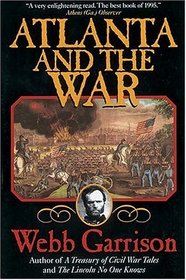I think of Atlanta in 1865 when I walk to the bus stop and see the results of the Immigration Act of 1965, i.e. people living on the streets and too many of them being our Black comrades who are mostly descended from people in this country for 250 or 300 years.
Most of this well-written and fast moving book is about the battles of the CSA and USA (up to and including Chapter 20) to take Atlanta in the fall of 1864. This was done by defeating the Army of Tennessee.
Chapters 20 and 21 are about how Atlanta emptied out, even including residents sent away as refugees.
Chapter 22. While the US Army took central Georgia, the CSA was still too strong for them to think of holding it for long. If not holding a port, supplies came from Louisville on single track RRs and the army would take a thousand casualties a month to hold the RRs.
Garrison lays out argument that the fastest way to reinforce Grant in Virginia was to march to an Atlantic seaport rather than march 1,000 miles overland, passing through some areas largely stripped of provender. The author is also interested in how Sherman had gained some expertise in manipulating the press, despite his often expressed dislike of politicians (excepting his brother). Chapter 23. After considerable correspondence (mostly via telegraph) about where the army should go, Lincoln's victory at the polls led to the army's departure from Atlanta a couple of days later. "The Union victory in Georgia was of sufficient military weight to tip the scales toward a second term for Lincoln." Lincoln's reelection was doubtful given the butcher's bill at Cold Harbor, etc. etc. There were many Copperheads, not all states would send clerks to collect the soldiers' vote, and the 1864 draft call for 500,000 men to serve three years was certainly unpopular. Note that government employees had 5% deducted from their pay for the GOP (much like machine politics of later decades) and that Lincoln himself had hired a substitute (no one knows why).
Chapter 24. General Sherman tore up the RRs and burned part of the city, already heavily damaged in the fighting--a lot of artillery was employed. The CSA took it back after he departed for the Eastern Seaboard and in 1865 it came again under occupation. But my own idea that it was full of people with no place to go is wrong or that situation lasted a very short time. It actually was a place that blossomed with peace, soon having a population of 12,000, compared to 3,000 in 1850, when Atlanta was a little known town. The celebrations in the North upon its fall put Atlanta on the map nationally.
A mark of its subsequent prosperity is the Cotton Exposition of 1881. The city prospered through connections with northern capital.
Endnotes, index, and bibliography.
Most of this well-written and fast moving book is about the battles of the CSA and USA (up to and including Chapter 20) to take Atlanta in the fall of 1864. This was done by defeating the Army of Tennessee.
Chapters 20 and 21 are about how Atlanta emptied out, even including residents sent away as refugees.
Chapter 22. While the US Army took central Georgia, the CSA was still too strong for them to think of holding it for long. If not holding a port, supplies came from Louisville on single track RRs and the army would take a thousand casualties a month to hold the RRs.
Garrison lays out argument that the fastest way to reinforce Grant in Virginia was to march to an Atlantic seaport rather than march 1,000 miles overland, passing through some areas largely stripped of provender. The author is also interested in how Sherman had gained some expertise in manipulating the press, despite his often expressed dislike of politicians (excepting his brother). Chapter 23. After considerable correspondence (mostly via telegraph) about where the army should go, Lincoln's victory at the polls led to the army's departure from Atlanta a couple of days later. "The Union victory in Georgia was of sufficient military weight to tip the scales toward a second term for Lincoln." Lincoln's reelection was doubtful given the butcher's bill at Cold Harbor, etc. etc. There were many Copperheads, not all states would send clerks to collect the soldiers' vote, and the 1864 draft call for 500,000 men to serve three years was certainly unpopular. Note that government employees had 5% deducted from their pay for the GOP (much like machine politics of later decades) and that Lincoln himself had hired a substitute (no one knows why).
Chapter 24. General Sherman tore up the RRs and burned part of the city, already heavily damaged in the fighting--a lot of artillery was employed. The CSA took it back after he departed for the Eastern Seaboard and in 1865 it came again under occupation. But my own idea that it was full of people with no place to go is wrong or that situation lasted a very short time. It actually was a place that blossomed with peace, soon having a population of 12,000, compared to 3,000 in 1850, when Atlanta was a little known town. The celebrations in the North upon its fall put Atlanta on the map nationally.
A mark of its subsequent prosperity is the Cotton Exposition of 1881. The city prospered through connections with northern capital.
Endnotes, index, and bibliography.




